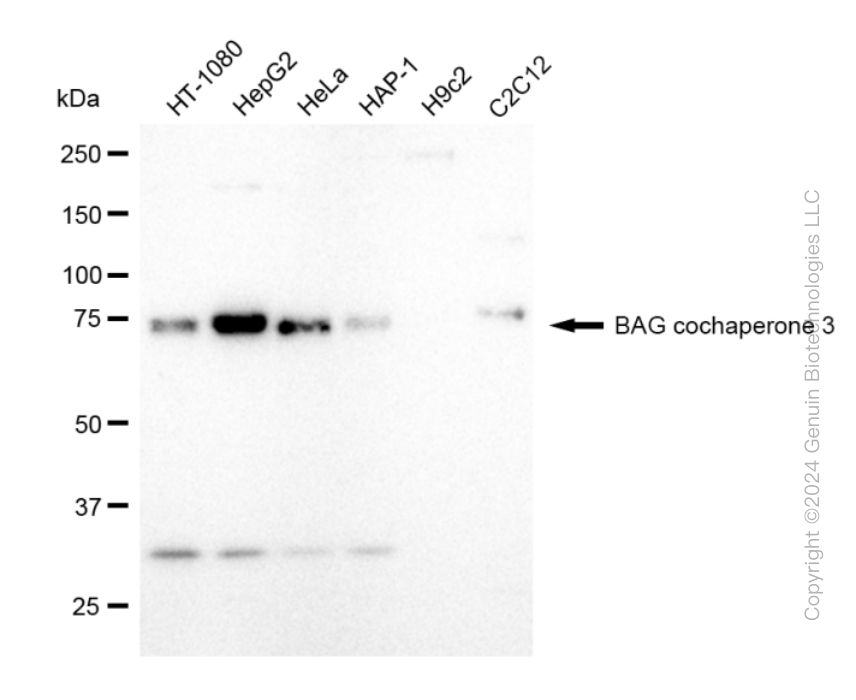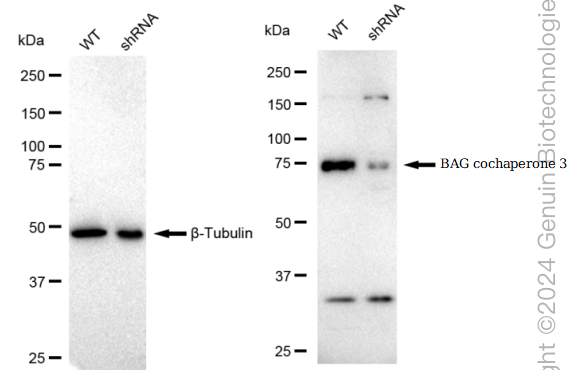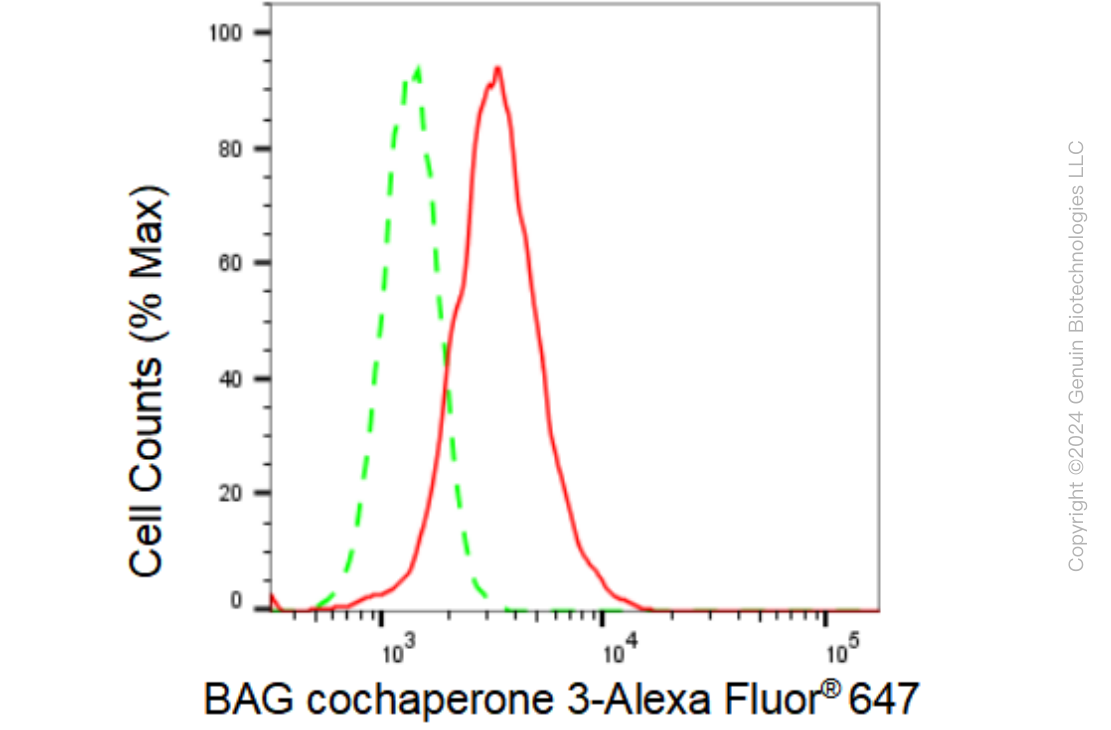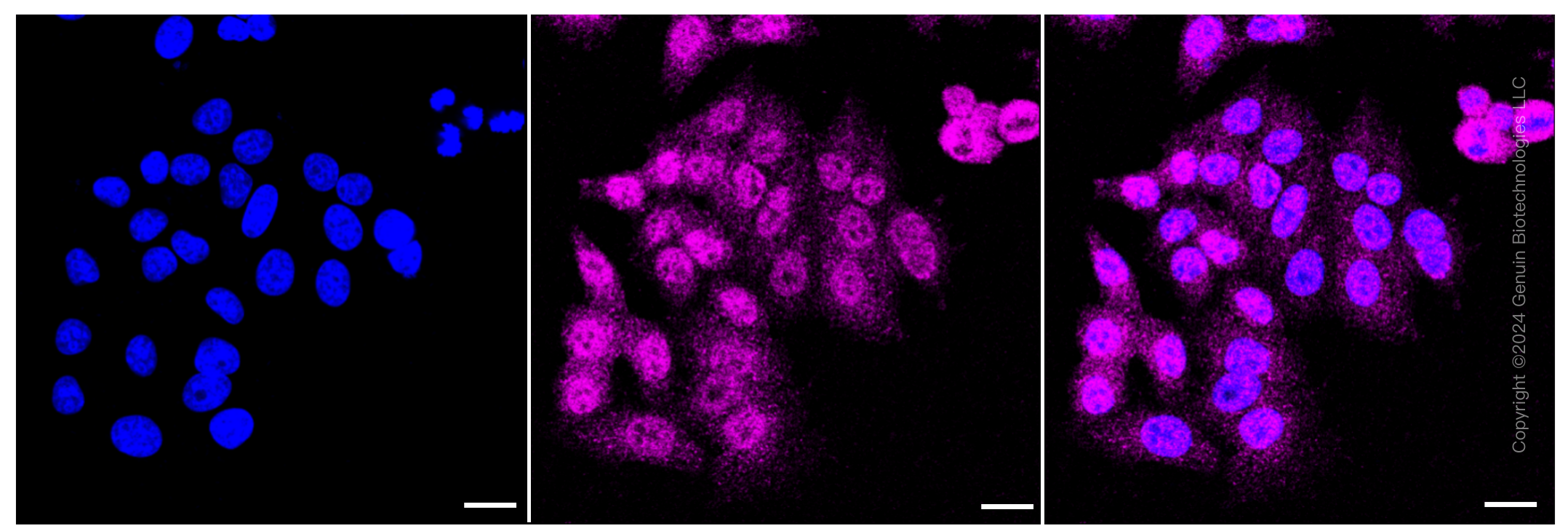KD-Validated Anti-BAG cochaperone 3 Rabbit Monoclonal Antibody
Rabbit monoclonal antibody
- SPECIFICATION
- CITATIONS
- PROTOCOLS
- BACKGROUND

Application
| WB, FC, ICC |
|---|---|
| Primary Accession | O95817 |
| Reactivity | Human, Mouse |
| Clonality | Monoclonal |
| Isotype | Rabbit IgG |
| Clone Names | 23GB1520 |
| Calculated MW | Predicted, 6 2 kDa ; Observed, 80 kDa |
| Gene Name | BAG3 |
| Aliases | BAG3; BAG Cochaperone 3; BAG Family Molecular Chaperone Regulator 3; BCL2 Associated Athanogene 3; Bcl-2-Binding Protein Bis; Docking Protein CAIR-1; BAG-3; BIS; Bcl-2-Binding Protein BIS Transcript 2; Bcl-2-Associated Athanogene 3; BCL2-Binding Athanogene 3; CAIR-1; MFM6 |
| Immunogen | A synthesized peptide derived from human Bag3 |
| Gene ID | 9531 |
|---|---|
| Other Names | BAG family molecular chaperone regulator 3, BAG-3, Bcl-2-associated athanogene 3, Bcl-2-binding protein Bis, Docking protein CAIR-1, BAG3, BIS |
| Name | BAG3 |
|---|---|
| Synonyms | BIS |
| Function | Co-chaperone and adapter protein that connects different classes of molecular chaperones including heat shock proteins 70 (HSP70s), e.g. HSPA1A/HSP70 or HSPA8/HSC70, and small heat shock proteins (sHSPs), e.g. HSPB8 (PubMed:27884606, PubMed:30559338). Acts as a nucleotide-exchange factor (NEF) promoting the release of ADP from HSP70s, thereby triggering client protein release (PubMed:27884606, PubMed:30559338). Nucleotide release is mediated via BAG3 binding to the nucleotide-binding domain (NBD) of HSP70s, whereas client release is mediated via binding to the substrate-binding domain (SBD) (PubMed:27474739, PubMed:9873016). Has anti-apoptotic activity (PubMed:10597216). Plays a role in the HSF1 nucleocytoplasmic transport (PubMed:26159920). |
| Cellular Location | Nucleus. Cytoplasm. Note=Colocalizes with HSF1 to the nucleus upon heat stress (PubMed:26159920) |

Thousands of laboratories across the world have published research that depended on the performance of antibodies from Abcepta to advance their research. Check out links to articles that cite our products in major peer-reviewed journals, organized by research category.
info@abcepta.com, and receive a free "I Love Antibodies" mug.
Provided below are standard protocols that you may find useful for product applications.
If you have used an Abcepta product and would like to share how it has performed, please click on the "Submit Review" button and provide the requested information. Our staff will examine and post your review and contact you if needed.
If you have any additional inquiries please email technical services at tech@abcepta.com.














 Foundational characteristics of cancer include proliferation, angiogenesis, migration, evasion of apoptosis, and cellular immortality. Find key markers for these cellular processes and antibodies to detect them.
Foundational characteristics of cancer include proliferation, angiogenesis, migration, evasion of apoptosis, and cellular immortality. Find key markers for these cellular processes and antibodies to detect them. The SUMOplot™ Analysis Program predicts and scores sumoylation sites in your protein. SUMOylation is a post-translational modification involved in various cellular processes, such as nuclear-cytosolic transport, transcriptional regulation, apoptosis, protein stability, response to stress, and progression through the cell cycle.
The SUMOplot™ Analysis Program predicts and scores sumoylation sites in your protein. SUMOylation is a post-translational modification involved in various cellular processes, such as nuclear-cytosolic transport, transcriptional regulation, apoptosis, protein stability, response to stress, and progression through the cell cycle. The Autophagy Receptor Motif Plotter predicts and scores autophagy receptor binding sites in your protein. Identifying proteins connected to this pathway is critical to understanding the role of autophagy in physiological as well as pathological processes such as development, differentiation, neurodegenerative diseases, stress, infection, and cancer.
The Autophagy Receptor Motif Plotter predicts and scores autophagy receptor binding sites in your protein. Identifying proteins connected to this pathway is critical to understanding the role of autophagy in physiological as well as pathological processes such as development, differentiation, neurodegenerative diseases, stress, infection, and cancer.





